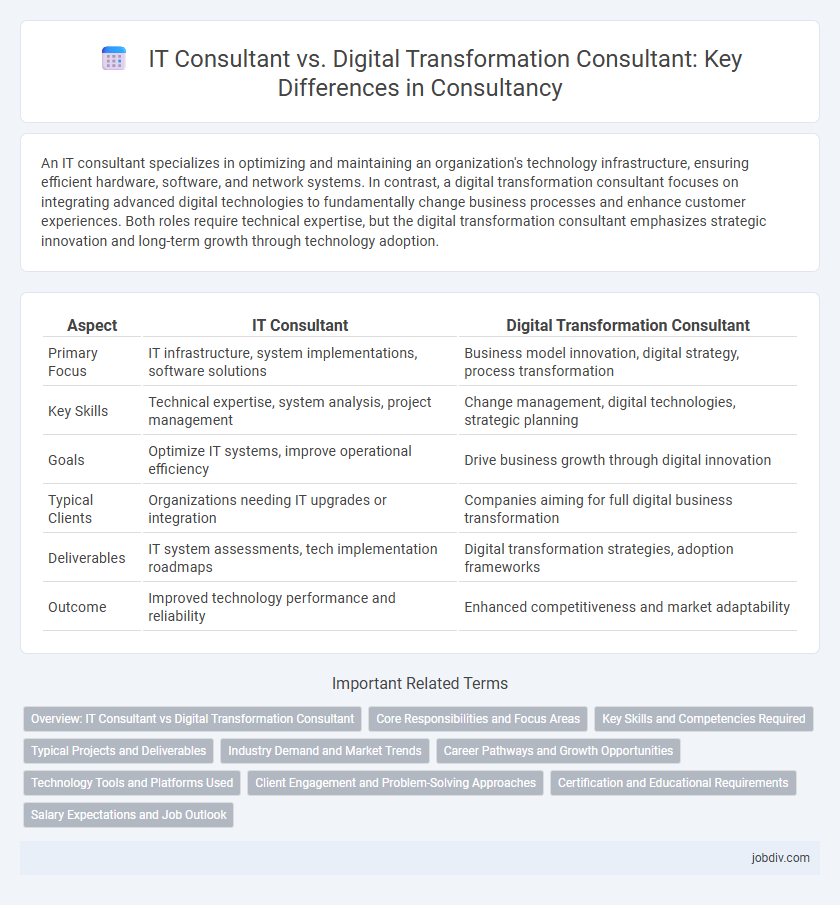An IT consultant specializes in optimizing and maintaining an organization's technology infrastructure, ensuring efficient hardware, software, and network systems. In contrast, a digital transformation consultant focuses on integrating advanced digital technologies to fundamentally change business processes and enhance customer experiences. Both roles require technical expertise, but the digital transformation consultant emphasizes strategic innovation and long-term growth through technology adoption.
Table of Comparison
| Aspect | IT Consultant | Digital Transformation Consultant |
|---|---|---|
| Primary Focus | IT infrastructure, system implementations, software solutions | Business model innovation, digital strategy, process transformation |
| Key Skills | Technical expertise, system analysis, project management | Change management, digital technologies, strategic planning |
| Goals | Optimize IT systems, improve operational efficiency | Drive business growth through digital innovation |
| Typical Clients | Organizations needing IT upgrades or integration | Companies aiming for full digital business transformation |
| Deliverables | IT system assessments, tech implementation roadmaps | Digital transformation strategies, adoption frameworks |
| Outcome | Improved technology performance and reliability | Enhanced competitiveness and market adaptability |
Overview: IT Consultant vs Digital Transformation Consultant
IT Consultants specialize in optimizing existing technology infrastructure and ensuring system efficiency through tailored IT solutions and support. Digital Transformation Consultants focus on driving comprehensive business change by integrating advanced digital technologies, enhancing customer experience, and enabling innovation across all organizational processes. Both roles require deep expertise but differ in scope, with IT Consultants maintaining operational IT performance and Digital Transformation Consultants spearheading strategic digital evolution.
Core Responsibilities and Focus Areas
IT Consultants specialize in optimizing and managing enterprise IT infrastructure, focusing on system integration, cybersecurity, and software implementation to enhance operational efficiency. Digital Transformation Consultants drive comprehensive organizational change by leveraging emerging technologies such as AI, cloud computing, and data analytics to modernize business processes and improve customer experience. Core responsibilities for IT Consultants include IT strategy alignment and technical support, while Digital Transformation Consultants emphasize innovation management, change leadership, and digital strategy development.
Key Skills and Competencies Required
IT Consultants require strong technical expertise in systems architecture, software development, and cybersecurity, combined with problem-solving skills to optimize IT infrastructure. Digital Transformation Consultants emphasize strategic thinking, change management, and a deep understanding of emerging technologies such as AI, IoT, and cloud computing to drive business innovation. Both roles demand excellent communication, project management abilities, and a customer-centric approach to align technology solutions with business goals.
Typical Projects and Deliverables
IT Consultants often lead projects involving infrastructure upgrades, system integrations, and cybersecurity enhancements, delivering detailed technical assessments, implementation roadmaps, and post-deployment support documentation. Digital Transformation Consultants focus on business process reengineering, technology adoption strategies, and customer experience improvements, providing digital maturity assessments, strategic transformation blueprints, and change management plans. Both roles emphasize aligning technology solutions with organizational goals, but IT Consultants prioritize technical optimization, whereas Digital Transformation Consultants drive holistic business innovation.
Industry Demand and Market Trends
IT Consultants specialize in optimizing existing technology infrastructure and ensuring system efficiency, which remains critical as businesses maintain legacy systems. Digital Transformation Consultants drive comprehensive innovation by integrating emerging technologies like AI, cloud computing, and IoT to redefine business models, reflecting rapid growth in demand across industries aiming to enhance competitiveness. Market trends indicate a rising preference for Digital Transformation Consultants due to accelerating digitalization, while consistent IT consulting remains essential for operational stability.
Career Pathways and Growth Opportunities
IT Consultants typically specialize in technology infrastructure, software implementation, and system optimization, offering a strong foundation in technical skills and project management. Digital Transformation Consultants focus on integrating digital technologies to reshape business processes, emphasizing strategic innovation, change management, and cross-functional collaboration. Career pathways for IT Consultants often lead to roles such as IT Manager or Solutions Architect, while Digital Transformation Consultants can progress toward Chief Digital Officer or Strategic Advisor positions, reflecting greater involvement in organizational leadership and growth initiatives.
Technology Tools and Platforms Used
IT Consultants primarily utilize technology tools such as enterprise resource planning (ERP) systems, network infrastructure platforms, and cybersecurity applications to optimize existing IT environments. Digital Transformation Consultants focus on leveraging advanced platforms like cloud computing services, artificial intelligence (AI) frameworks, and data analytics solutions to drive business innovation. Both roles require proficiency in collaboration tools and project management software to align technology integration with organizational goals.
Client Engagement and Problem-Solving Approaches
IT consultants specialize in optimizing and managing technology infrastructure, focusing on client engagement through technical assessments and solution implementation, while digital transformation consultants drive holistic business change by aligning digital strategies with organizational goals, emphasizing stakeholder collaboration and innovative problem-solving. The IT consultant's approach centers on diagnosing technical issues and delivering tailored IT solutions, whereas digital transformation consultants facilitate cross-functional workshops to identify process inefficiencies and recommend end-to-end digital ecosystems. Both roles require strong communication skills, but digital transformation consultants often leverage design thinking and agile methodologies to navigate complex business challenges and foster client buy-in across departments.
Certification and Educational Requirements
IT Consultants typically hold certifications such as CompTIA A+, Cisco Certified Network Associate (CCNA), or Microsoft Certified: Azure Solutions Architect Expert, emphasizing technical expertise in hardware, networking, and software systems. Digital Transformation Consultants often require advanced business and strategic certifications like Certified Digital Transformation Professional (CDTP) or Agile Scrum Master, complemented by educational backgrounds in business administration, IT management, or innovation leadership. Both roles benefit from continuous education, but Digital Transformation Consultants prioritize a blend of technology and business strategy certifications to drive organizational change effectively.
Salary Expectations and Job Outlook
IT Consultants typically earn salaries ranging from $70,000 to $120,000 annually, with growing demand driven by businesses seeking technology integration and infrastructure improvements. Digital Transformation Consultants command higher salaries, often between $90,000 and $150,000, due to their expertise in guiding organizations through comprehensive digital strategy shifts and innovation adoption. The job outlook for Digital Transformation Consultants is particularly strong as companies prioritize digital maturity to remain competitive in evolving markets.
IT Consultant vs Digital Transformation Consultant Infographic

 jobdiv.com
jobdiv.com